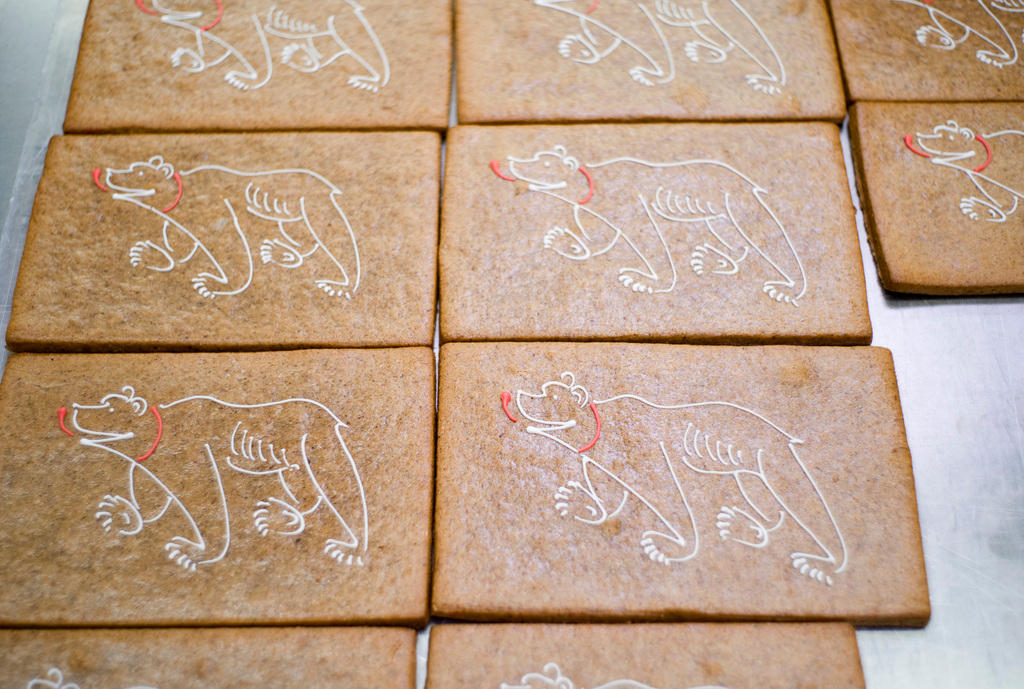
Swiss tuck into movable feast

In most European countries, Christmas dinner - turkey in Britain or goose in Germany - is almost sacrosanct.
But Switzerland does not have a single traditional dish. Regional specialities compete alongside more modern meals and conventions.
It is traditional in Switzerland for families and friends to come together to celebrate Christmas. But what they eat varies.
“In Switzerland, there is no classic Christmas meal,” Esther Infanger, a nutritionalist at the Swiss Foundation for Nutrition Research, told swissinfo. “But people do eat well and in copious amounts.”
Most Swiss work until mid-afternoon on December 24, even though their biggest Christmas celebration takes place the same evening. In most households, the tree – secretly decorated by adults – is unveiled to the children, gifts are opened and many families attend a late-night church service.
With so much scheduled for Christmas Eve, there is little time to prepare an elaborate meal.
Families tend to make do with the traditional “Schüfeli” (literally “small shovel”) or “Rollschinkli”, a large chunk of boiled ham that can be easily cooked, which is still popular from Appenzell to Fribourg.
Regional variations
Meat and poultry are a Christmas staple and have been since medieval times. In many parts of French-speaking Switzerland, turkey stuffed with chestnuts appears for Christmas dinner.
In Neuchâtel, it may be served with endives baked in cream (chicorée Neuchâteloise), while in Geneva it usually comes with “gratin de cardons”, made from cardoons, which are a type of artichoke.
Another popular dinner, at least in German-speaking Lucerne, is an enormous “Pastete” (a “vol-au-vent” pastry shell) bought at a bakery and then filled at the table with a rich mixture of veal and mushrooms in a cream sauce.
Changing traditions
But one non-Swiss dish has been giving the traditional dishes a run for their money at Christmas.
“Fondue Chinoise” – paper-thin slices of meat cooked at the table in boiling broth and dipped into exotic sauces – is now also proving to be a favourite meal.
Infanger attributes its rising popularity to the fact that busy families often welcome a dish that does not need much effort and time to prepare. It also a very convivial meal.
And it is not just what the Swiss eat that is changing. Infanger has also noticed a change in social behaviour at family parties.
“People are no longer simply invited to the big family meal. The guests now bring the dessert or starter with them, or younger people prepare the meal together,” she explained.
Sweet tooth
Despite the regional differences, there is one culinary tradition that unites Switzerland during Yuletide – home-made cookies. Many Swiss agree that Christmas just wouldn’t be Christmas without them.
The list is long and varied: rock-hard “Aniskräbbeli”; “Basler Brunsli”, dark with cocoa; jam-filled “Spitzbueben”; bas-relief dough sculptures called “Züri Tirrgel”, spicy “Lebkuchen”; and the strangely named “Totenbeinli” (or “little corpse legs”), decorated with whole hazelnuts.
Two more beloved Swiss Christmas foods are chocolate and oranges. Colourful, foil-wrapped chocolates are hung on the Christmas tree so that they can be removed and eaten with abandon from December 24 onwards. Mandarin oranges are popular too.
So despite having no single dish at Christmas, Switzerland still keeps alive some of its old traditions while incorporating the new.
And there is no doubt that the feast is very much enjoyed by everyone – both young and old.
swissinfo
The Swiss don’t have a traditional Christmas dinner as in other countries – there are many regional dishes instead.
Fondue Chinoise is also very popular.
The Swiss love making home-made cookies for Christmas.

In compliance with the JTI standards
More: SWI swissinfo.ch certified by the Journalism Trust Initiative

















![The four-metre-long painting "Sonntag der Bergbauern" [Sunday of the Mountain Farmers, 1923-24/26] had to be removed by a crane from the German Chancellery in Berlin for the exhibition in Bern.](https://www.swissinfo.ch/content/wp-content/uploads/sites/13/2025/12/01_Pressebild_KirchnerxKirchner.jpg?ver=8f77363a)











You can find an overview of ongoing debates with our journalists here . Please join us!
If you want to start a conversation about a topic raised in this article or want to report factual errors, email us at english@swissinfo.ch.